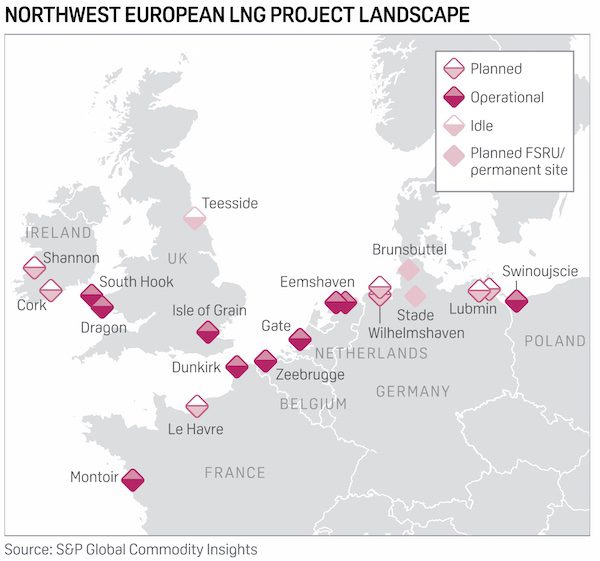Germany’s Uniper on Dec. 21 sent the first LNG regasified at the new floating import terminal at Wilhelmshaven into the German grid, a company spokesperson said Dec. 22.
The floating storage and regasification unit Hoegh Esperanza arrived at Wilhelmshaven port on Dec. 15 carrying LNG that had been re-loaded at the Sagunto terminal in Spain.
A total of around 4 million cu m was sent out into the grid on Dec. 21, according to ENTSOG transparency data.
It marked the first time that LNG regasified in Germany has been delivered into the country’s gas network. “I can confirm that first gas was sent out yesterday,” the Uniper spokesperson said.
Uniper had originally planned to send out first gas on Dec. 22 but brought forward its commissioning activities.
The company said in a transparency note Dec. 21 that it planned send-outs from Wilhelmshaven of 15-155 /d — 1.5-15 million cu m/d — in the test phase.
“Commercial operation is still planned to commence mid-January with a maximum daily capacity of about 155 /d,” it said.
A cargo of US LNG loaded at the Calcasieu Pass terminal is headed for Wilhelmshaven with an expected arrival date of Jan. 2, according to Platts cFlow ship and commodity tracking software from S&P Global Commodity Insights.
The cargo is being carried aboard the Maria Energy tanker, which left Calcasieu Pass on Dec. 20.
Supply security
The Wilhelmshaven terminal is the first to start operations in Germany, with two more FSRUs expected to be operational soon.
Privately owned Deutsche ReGas hopes to start commissioning its 5.2 /year terminal at Lubmin before the end of December and said Dec. 22 it had received a key approval from the European Commission.
“Deutsche ReGas has received from the European Commission confirmation of the exemption from regulation granted by the German regulator,” it said in a statement.
RWE, meanwhile, plans to deploy a state-backed FSRU at Brunsbuttel in January.
Germany has flagged the timely startup of LNG imports as key to its gas supply security this winter.
The country was particularly hard hit this year by the reduced Russian gas deliveries, which pushed European gas prices to record highs in late summer.
German buyers of Russian gas were forced to procure substitute gas on the open market at significant cost.
Platts, part of S&P Global Commodity Insights, assessed the benchmark Dutch TTF month-ahead price at an all-time high of /MWh on Aug. 26.
Prices have weakened since on the back of healthy storage and demand curtailments, though prices remain historically high with Platts assessing the TTF month-ahead price Dec. 21 at /MWh.





